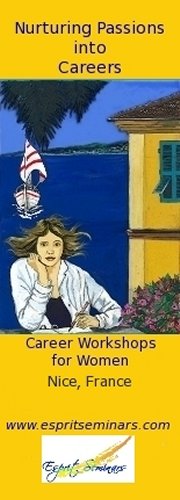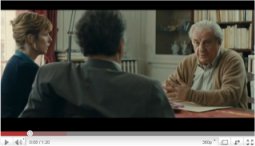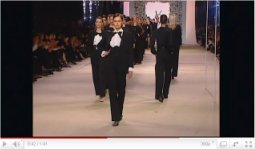Books and Films
Film Reviews
Get a taste of French culture with this week's selection of Gallic movies.
In the early seventeenth century, Hungarian countess Elizabeth Bathory was embroiled in a nationwide scandal after being accused of torturing and killing hundreds of peasant girls at Cachtice Castle, located in modern Slovakia. Rumour has it that she would bathe in the virgins' blood, which she claimed was an elixir of eternal youth. Although the charges were never substantiated, her case was to inspire many stories and it gave rise to a legend that has become deep-rooted in European folklore. Born to an aristocratic family from Transylvania, Elizabeth was an intelligent, educated woman who ran her husband's estates in his absence and had a say in local government. After becoming a widow at the age of forty-four, she gained recognition with the help of her confidante Anna Darvulia and soon became the most prominent and wealthy woman in the country. A few years later, she fell in love with Istvan Thurzo, twenty years her junior, with whom she had a passionate affair. When his father ended their idyll for political reasons, the countess was heartbroken. She was convinced that her lover had left her for a younger woman. This marked the start of her obsession with ageing. Such a powerful, charismatic figure had to be entrusted to a talented actress. I must admit that, before seeing the film, I had serious doubts about Julie Delpy's chances of success. Up to then, her career seemed confined to soppy romantic comedies like Before Sunset or Two Days in Paris. However, she must have matured as I found her interpretation of the “Blood Countess” perfectly adequate. Her natural authority and steely presence are enough to send chills down your spine. She wrote the music and the screenplay for this third feature, which she also chose to produce. In Delpy's biography of Countess Bathory, the heroine comes across as a complex character – spiteful and merciless, yet at the same time passionate and vulnerable. In other words, a woman....
Since the early 1990s, Renaud Fely has worked as Second Unit Director and Assistant Director on a number of French productions attributed to heavyweights such as Maurice Pialat, Pascale Ferran and Jacques Doillon. He signed two shorts in 1995 and 2002 before lensing Pauline and François, his first feature film. Collaborating on Lady Chatterley triggered his passion for nature and he set his movie in the picturesque Creuse area. Recently-widowed Pauline moves to a small town in Central France, where she has been hired as a bank manager. She landed the job through her friend Catherine, who has also found her a small cottage in the country. Catherine's brother François lives next door, across the courtyard. He is a solitary soul devoted to his sister, brother-in-law and father, with whom he works as a roofer. A hunting accident in his youth caused the death of his little brother, a tragedy that still haunts his conscience. The main characters are both emotionally wounded and in a state of mourning. The story recounts their burgeoning friendship and subsequent romance. Skillful directing coupled with a humane approach make up for the sketchy script. One magic scene takes place in the depths of the forest, where they have come to hear the stags' mating call. Huddled side by side in total darkness, whispering in hushed tones, they share precious moments of intimacy. Another brilliant vignette is an informal dinner that acts as a catharsis for family and social tensions. Léa Drucker gives a stunning performance as Catherine, burdened with financial worries, who resents Pauline's growing influence on her brother. For his heroine, Renaud Fely chose Laura Smet, daughter of France's rock icon Johnny Halliday and popular actress Nathalie Baye. Her low-key demeanour and sensitive portrayal of Pauline confirm that this was indeed a wise decision. Her partner Yannick Renier, a Belgian actor with television experience, deserves just as much praise. Even Catherine's sour-tempered husband Serge makes a worthy contribution. Anémone, better known to film buffs as Thérèse in Le Père Noël est une Ordure, is extremely moving as the mother of Pauline's late husband. The magnetic soundtrack was composed by French musician and songwriter Jean-Louis Murat. In short, a simple, unpretentious tale that should go straight to your heart....
Gustave Kervern and Benoît Delépine's main claim to fame is Groland, a fiercely satirical TV programme broadcast on Canal Plus since 1992. They also scripted and shot the hilarious features Aaltra and Louise-Michel. Their latest collaborative effort is in the same vein – an original, zany road movie bristling with joie de vivre. Serge Pilardosse – nicknamed Mammuth after his 1970 Munch motorcycle - is a young pensioner who has just turned sixty. He needs to hunt down his former employers so that he may collect all his benefits and enjoy a long comfortable retirement. He gets out the old bike, dusts it down and sets off on his Tour de France. His quest to lay hands on the missing papers is doomed from the start: companies have closed down, buildings have been razed, names have changed and there is no trace of his passage before the advent of almighty computers. The movie denounces a world riddled with paperwork in which individuals are gradually losing their identity. One is reminded of Jacques Tati, a staunch critic of bureaucracy and consumerism (Mon Oncle). One of the funniest scenes shows Serge's wife – Yolande Moreau, impeccable, as always - struggling with an answerphone. Another highlight is the farewell gathering attended by Mammuth's colleagues to celebrate his departure. The two directors cast Gérard Depardieu as the ageing rider and he pulls it off splendidly. Larger than life, his long hair streaming in the wind, he is at once convincing and deeply moving. During his travels he runs into various people - a long-forgotten relative, a female con artist, a nutty beachcomber, a New Age sculptress, a crooning gravedigger - with whom he whiles away the time. Most of them are social misfits who have given up on society. There is a strong poetic streak in this offbeat narrative, magnified by its 8mm format and grainy images. My only reservation concerns Serge's reminiscences, featuring Isabelle Adjani as his first true love, killed in a motorcycle accident. Her bloodied features, fixed expression and monotonous delivery are both grotesque and unnecessary. A pity, because apart from these flashbacks, Mammuth deserves full marks.....
Following two shorts in 2000 and Cold Showers in 2005, Antony Cordier's second feature was selected for the 67th Venice Mostra in September this year. It all starts with a business encounter: jewellery designer Rachel meets her client Vincent to discuss details of his new website. The strong chemistry between them is palpable and sets the tone of the film. A few days later, she invites Vincent and his wife Teri round to dinner at her place, where she lives with Franck and their young daughter. They all immediately hit it off and are irresistibly attracted towards one another. Teri and Franck end up kissing on the carpet during a sensuous back massage. Shortly afterwards, the four embark on an adulterous relationship in which they swap partners. The unfaithful couples meet up whenever they can, while at the same time socialising as friends. The only rules? No sleeping overnight and no telling the children. The affair lasts for a while but eventually takes its toll on their daily lives and ceases at the instigation of the girls. The break-up is definitive and the two families go their separate ways. The French have always loved intimist films that explore the complexities of human behaviour. In recent years, this trend has been typified by youngish directors like Arnaud Desplechin, former film critic Olivier Assayas and Jacques Audiard, whose father Michel was a gifted and highly-respected screenwriter. Happy Few takes up the tradition but fails to make a point. The blossoming of this romance is well observed and aptly described but the story goes nowhere. The reasons behind the split-up are unclear and the characters' doubts about their own feelings, voiced off screen, come across as narcissistic. For a film revolving around sex, the lovemaking is remarkably dull. With one possible exception: during a visit to Rachel's country house, the foursome indulge in an orgy of flour to satisfy Teri's teenage fantasy. The sole redeeming feature of this movie is its first-rate cast. The radiant Elodie Bouchez is utterly convincing as a former gymnastics champion who enjoys life to the full. Roschdy Zem plays a thoughtful but unsophisticated lover who keeps to himself. Vincent's ambiguous nature is deftly rendered by Nicolas Duvauchelle, a promising newcomer to the French film scene. As for Marina Foïs, the quiet, introspective personality she assumes for Rachel's role is a departure from her previous work. The discovery she makes regarding her masochistic tendencies is handled with great subtlety. If intellectual analysis bores you to tears, frankly, I would give it a miss. If, on the other hand, you believe that fine acting is paramount, then run along to see Happy Few and I guarantee that you will not be disappointed.
In Anne Le Ny's second feature, old-timer Michel Aumont plays Lucien Paumelle, a retired physician celebrated for his left-wing views and unflagging commitment to humanitarian causes. His children Arnaud and Babette are hardly surprised when he decides to take in a bunch of illegal immigrants to spare them from expulsion. You can imagine their reaction when the squatters turn out to be Tatiana, a raving beauty from Moldavia, and her little girl. To boot, they learn that Lucien has married the mother to help her obtain a residence permit. This situation is to prompt a series of unexpected events. The octagenarian activist falls hopelessly in love and starts a Viagra-fuelled relationship with his young lodger. Within a few weeks, he disinherits his offspring for Tatiana's benefit. The patriarch is suddenly knocked off his pedestal in the eyes of Babette, an unassuming woman who has always lived in her father's shadow. Her cosy, bourgeois world collapses overnight and she begins to question her dreary marriage to Rémy. Arnaud, a cynical business lawyer, suspects that his new mother-in-law is taking advantage of Lucien and his spending power. To a certain extent, he is right: Tatiana is quick to enrol her daughter at a decent school and acquire the consumer goods that were sorely lacking back home. This said, she is also a friendly, hard-working lass who finds employment as a hotel chambermaid. Anne Le Ny's characters are so endearing because they are just like you and me – multifaceted and fallible. The brother-sister relationship is beautifully portrayed thanks to flawless performances by Fabrice Luchini and Karin Viard. The night they spend together painting the town red is one of the film's high points. Eventually, Arnaud's wife denounces the two clandestines, who are deported and flown back to Moldavia. This short interlude is to leave its mark on the Paumelle household. When the story ends, Arnaud is making efforts to resume ties with his father. As for Babette, she has started an affair with a colleague and realised it is high time she lived her own life. Les Invités de Mon Père was hailed as a political comedy by the French press but I see it as a psychological study. Basically, it focuses on social attitudes and family values rather than immigration issues. And, as such, it does a pretty good job.....
You don't have to be a fashion victim to know that Yves Saint Laurent was one of the most influential designers in postwar France. He was born in Algeria in 1936 but moved to the French capital after high school and enrolled at the National Academy of Haute Couture, where he attended drawing classes. His talent was soon spotted by Christian Dior, who hired him as an assistant. When the latter died in 1957, the young designer took over the company at the tender age of 21. Three years later, after being dismissed by Dior, he succeeded in setting up his own fashion house with the French industrialist Pierre Bergé, who was to become his partner. The rest of his career is public knowledge. To be honest, I was slightly frustrated after seeing L'Amour Fou. The film is narrated by Bergé, who concentrates on their relationship, Yves's vulnerability and the houses where they spent time together. Considerable footage is devoted to their Parisian residence and the magnificent works of art which they had acquired over the years. After Saint Laurent's death in 2008, Pierre Bergé decided to part with these prized possessions and an exceptional sale was held at the Grand Palais. At one point, I began to wonder if the whole thing had been commissioned by Christie's.... Saint Laurent's fragile personality and depressive tendencies are referred to with elegance and restraint. Regrettably, we learn very little about his creative inspiration or his work as a designer. For me, the most fascinating pictures were those taken in his workshop: close-ups of Saint Laurent gazing at a model and adjusting a collar or a hem. The expression in his eyes speaks volumes about his passion for all things sartorial. Although Bergé's tone of voice remains impassive throughout the movie, one can feel the strong emotion behind his words. So, all in all, I would probably give it an average mark.









